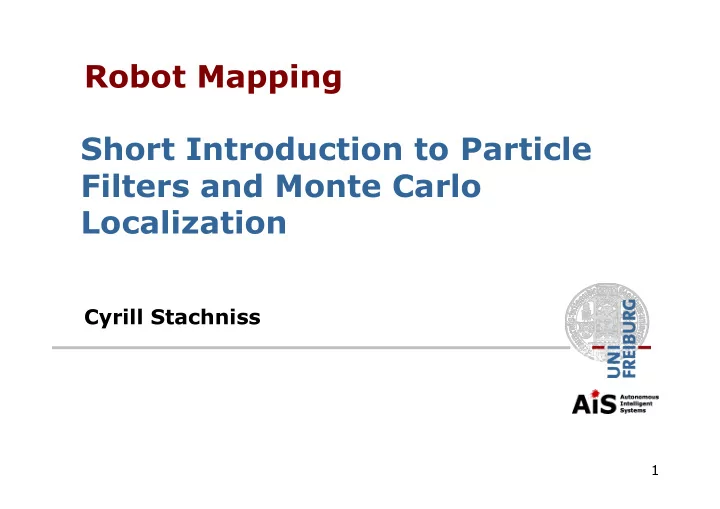

Robot Mapping Short Introduction to Particle Filters and Monte Carlo Localization Cyrill Stachniss 1
Gaussian Filters § The Kalman filter and its variants can only model Gaussian distributions 2
Motivation § Goal: approach for dealing with arbitrary distributions 3
Key Idea: Samples § Use multiple samples to represent arbitrary distributions samples 4
Particle Set § Set of weighted samples state importance hypothesis weight § The samples represent the posterior 5
Particles for Approximation § Particles for function approximation § The more particles fall into an interval, the higher its probability density How to obtain such samples? 6
Importance Sampling Principle § We can use a different distribution g to generate samples from f § Account for the “ differences between g and f ” using a weight w = f / g § target f § proposal g § Pre-condition: f(x)>0 à g(x)>0 7 7
Importance Sampling Principle 8
Particle Filter § Recursive Bayes filter § Non-parametric approach § Models the distribution by samples § Prediction: draw from the proposal § Correction: weighting by the ratio of target and proposal The more samples we use, the better is the estimate! 9
Particle Filter Algorithm 1. Sample the particles using the proposal distribution 2. Compute the importance weights 3. Resampling: “ Replace unlikely samples by more likely ones ” 10
Particle Filter Algorithm 11
Monte Carlo Localization § Each particle is a pose hypothesis § Proposal is the motion model § Correction via the observation model 12
Particle Filter for Localization 13
Application: Particle Filter for Localization (Known Map) 14
Resampling § Survival of the fittest: “ Replace unlikely samples by more likely ones ” § “Trick” to avoid that many samples cover unlikely states § Needed as we have a limited number of samples 15
Resampling w 1 w 1 w n w n w 2 w 2 W n-1 W n-1 w 3 w 3 § Stochastic universal § Roulette wheel sampling § Binary search § Low variance § O(n log n) § O(n) 16
Low Variance Resampling 17
initialization 18
observation 19
resampling 20
motion update 21
measurement 22
weight update 23
resampling 24
motion update 25
measurement 26
weight update 27
resampling 28
motion update 29
measurement 30
weight update 31
resampling 32
motion update 33
measurement 34
Summary – Particle Filters § Particle filters are non-parametric, recursive Bayes filters § Posterior is represented by a set of weighted samples § Not limited to Gaussians § Proposal to draw new samples § Weight to account for the differences between the proposal and the target § Work well in low-dimensional spaces 35
Summary – PF Localization § Particles are propagated according to the motion model § They are weighted according to the likelihood of the observation § Called: Monte-Carlo localization (MCL) § MCL is the gold standard for mobile robot localization today 36
Recommend
More recommend